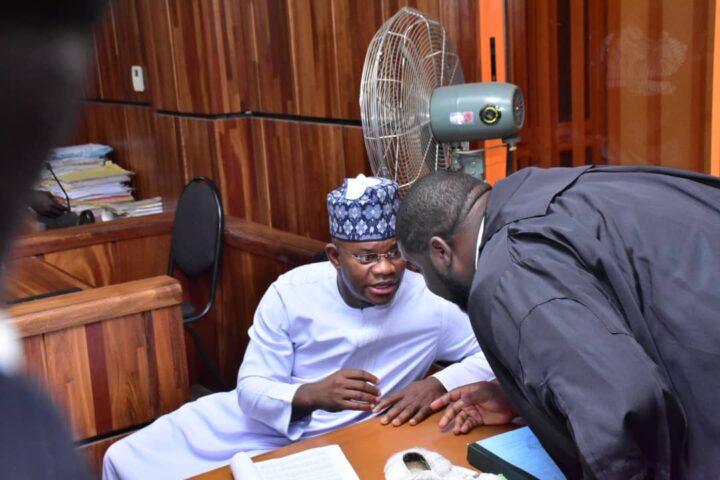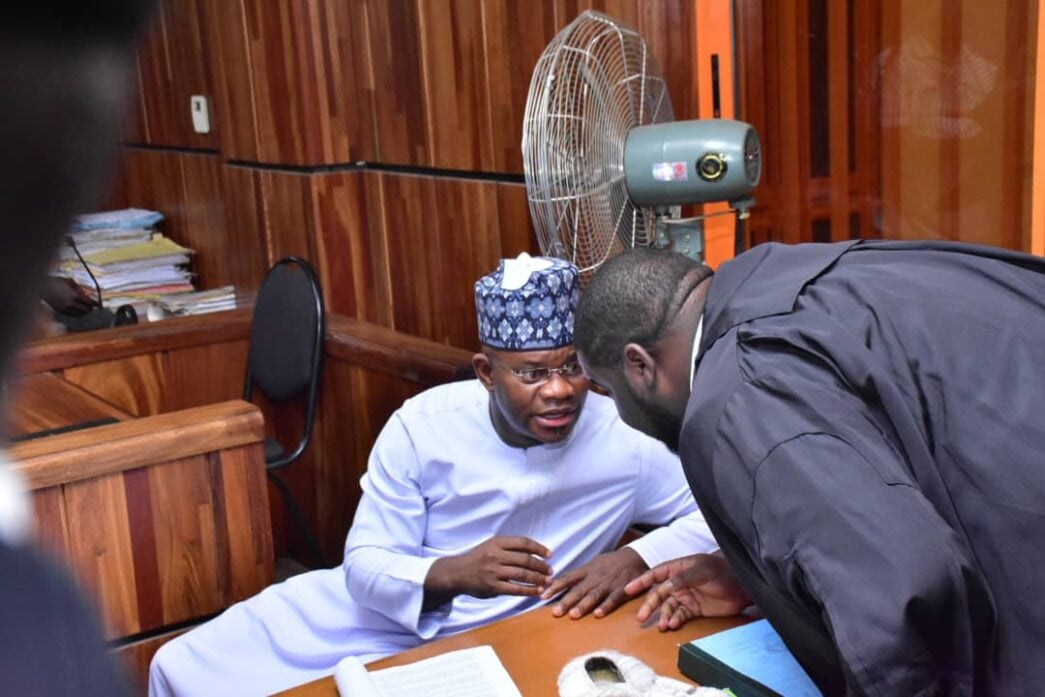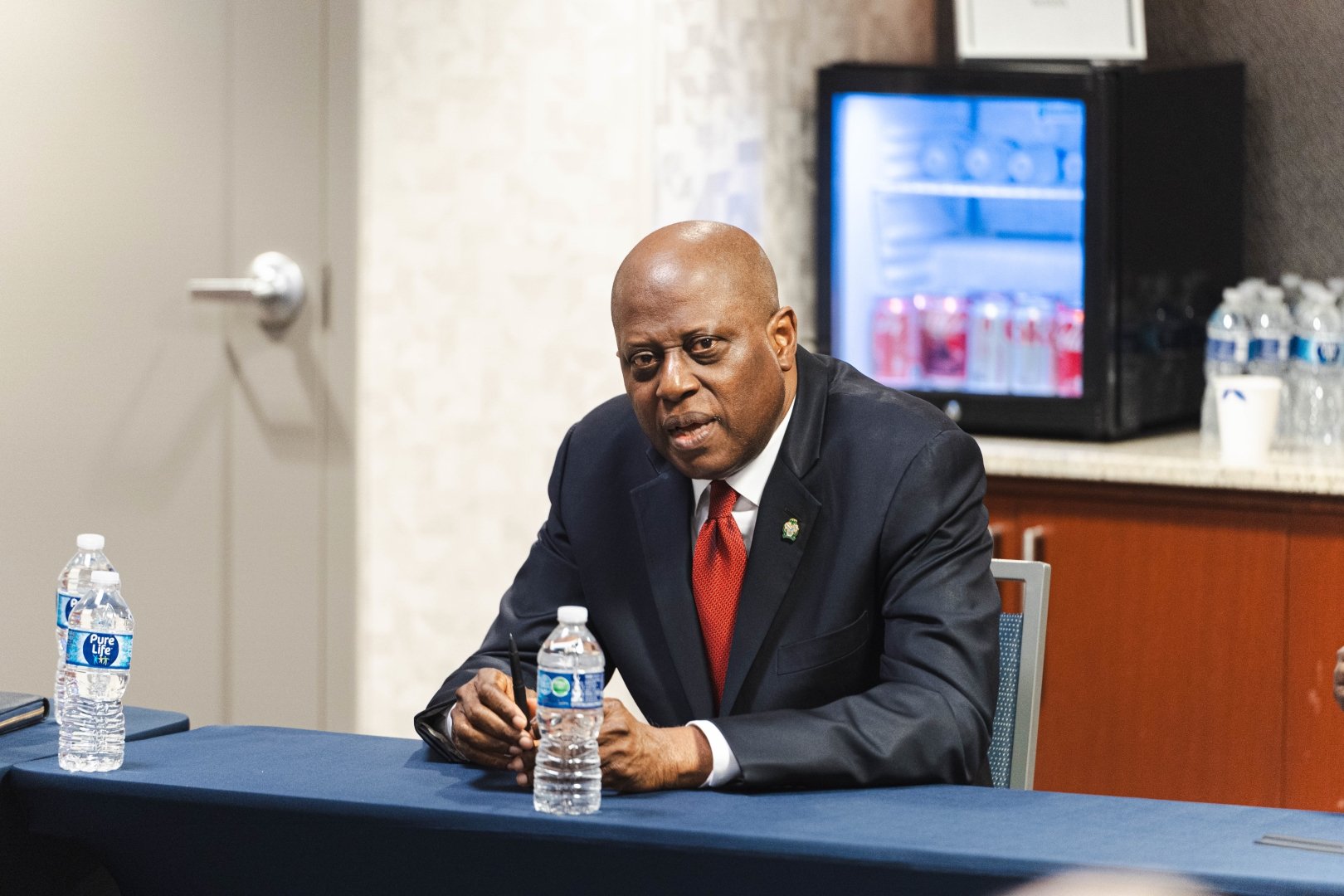File photo. Yahaya Bello in court
BY ABIODUN OLUWADARE
The recent arrest and remand of the former governor of Kogi state on allegations of fraud by the Economic and Financial Crimes Commission (EFCC) have once again thrust Nigeria’s judiciary into the spotlight. Nigerians are anxious and watching closely, not just for the drama surrounding a high-profile corruption case, but for the judiciary’s handling of it. This development brings to the forefront questions about the judiciary’s ability to fairly, transparently, and expediently adjudicate cases of corruption that have long plagued the country.
Will this case follow the disappointing path of many others, or will it signal a shift toward accountability and justice?
For over a year, the EFCC worked to effect this arrest—a process that in itself reflects inefficiencies in Nigeria’s legal and investigative systems. Allegations of corruption against public officials are not new, but the slow pace of investigations and arrests often diminishes public confidence. However, what happens after an arrest is even more crucial. Too often, Nigerians have seen cases of alleged criminality involving high-profile individuals either drag on indefinitely or end without any substantive resolution. This situation raises fundamental concerns about the judiciary’s effectiveness, its independence, and its commitment to upholding the rule of law.
Advertisement
A history of unresolved cases
Corruption cases involving prominent individuals have become a recurring theme in Nigeria’s judicial history.
From governors to senators, ministers to high-ranking officials, the cycle of accusations, arrests, and eventual stagnation or acquittal has become all too familiar.
For instance, consider the infamous cases of James Ibori, a former governor of Delta state, and Diepreye Alamieyeseigha, a former governor of Bayelsa state. Both were implicated in massive corruption scandals.
Advertisement
While Alamieyeseigha’s case ended in a controversial pardon after an initial conviction, Ibori’s case took a dramatic turn when he was convicted not in Nigeria but in the United Kingdom—a stinging indictment of the inefficacy of Nigeria’s judicial system.
Closer to the present, the case of a former governor of Abia state, Orji Uzor Kalu, illustrates the judiciary’s inconsistency. In 2019, Kalu was convicted and sentenced to 12 years imprisonment for a N7.65 billion fraud. However, his conviction was overturned on technical grounds, leaving the public disillusioned and sceptical of the judiciary’s willingness to hold the powerful accountable.
These examples are not isolated. They form part of a troubling pattern where powerful individuals appear to exploit legal loopholes, procedural delays, and questionable judicial rulings to evade justice.
What is wrong with the judiciary?
Advertisement
Several factors can account for the judiciary’s failures in handling high-profile corruption cases. If unaddressed, these will continue to undermine public trust in the judicial system.
The judiciary seems to have lost its independence. In Nigeria, the judiciary often operates under the shadow of political influence. High-profile corruption cases are frequently mired in politics, with allegations that judicial outcomes are dictated by the powerful rather than by the law.
Judges, in some cases, are accused of succumbing to external pressures or being complicit in stalling proceedings.
Ironically, the judiciary, tasked with upholding justice, is not immune to the scourge of corruption. Allegations of judges accepting bribes, succumbing to political pressure, or allowing financial interests to dictate their rulings have severely undermined public trust in the institution.
Advertisement
Such practices not only erode the credibility of the judiciary but also compromise the very foundation of justice, leaving citizens disillusioned and fostering a culture of impunity.
The adage “justice delayed is justice denied” rings alarmingly true in Nigeria’s legal system, where cases often languish in courtrooms for years.
Advertisement
This sluggish pace undermines the very essence of justice and erodes public confidence in the system. Compounding the issue is the frequent misuse of legal technicalities exploited by defendants to stall proceedings or secure dismissals. Such procedural manipulations not only frustrate the quest for accountability but also embolden wrongdoers, creating a perception that the judicial process can be weaponised to evade justice.
The challenges faced by the Economic and Financial Crimes Commission (EFCC) and similar prosecutorial agencies in Nigeria are deeply concerning. Frequently criticised for presenting poorly prepared cases, lacking robust evidence, and making procedural errors, these agencies inadvertently weaken the pursuit of justice.
Advertisement
These shortcomings create an open field for defence attorneys to exploit legal loopholes, often leading to the acquittal of individuals charged with serious crimes.
The failure to build watertight cases not only undermines the effectiveness of anti-corruption efforts but also casts doubt on the commitment of these institutions to deliver justice.
A growing sense of disillusionment among the public has become a significant obstacle to progress in Nigeria’s justice system. Repeated instances of high-profile corruption cases ending inconclusively or with no tangible consequences have fostered widespread apathy. This lack of public interest reduces the scrutiny and pressure on the judiciary and other institutions to act decisively. As accountability dwindles, a vicious cycle of inaction and impunity emerges, further eroding trust in the system and emboldening those who undermine the rule of law. Restoring public confidence demands visible and consistent consequences for corruption and wrongdoing.
Advertisement
Will this case be different from the usual unwarranted legal rhetoric?
The arrest of the former Kogi governor presents an opportunity for the judiciary to redeem itself. Nigerians are eager to see whether the case will set a precedence for accountability or fall into the familiar pattern of delays and inconclusive outcomes.
To ensure that this case does not end up as another disappointment, several steps must be taken:
The trial must be conducted with the utmost transparency to uphold the integrity of the judiciary and restore public confidence. Open and accessible proceedings are essential to ensure accountability and deter undue influence from political or financial quarters. By fostering a system where the public can observe and evaluate judicial actions, transparency not only builds trust but also sets a standard for fairness in high-profile cases.
Justice must be timely to be effective. While adherence to due process is non-negotiable, the judiciary must eliminate unnecessary delays that have historically plagued similar cases. Prioritising this case signals a commitment to delivering swift justice and demonstrates that the judiciary values the principle of accountability. A protracted trial risks eroding public trust further and undermining the broader fight against corruption.
The EFCC must leave no room for error in its prosecutorial efforts. A strong, evidence-backed case is essential to overcoming the procedural tactics often employed by defence teams to stall or derail justice. By meticulously preparing for potential challenges, prosecutors can ensure that their arguments hold up under scrutiny, reinforcing the credibility of the case and the institution.
A robust judiciary is one free from the influence of external pressures, whether political or financial. Judges presiding over this case must operate with complete impartiality, basing their decisions solely on the merits of the evidence presented. Judicial independence is not just a cornerstone of justice but also a signal to both domestic and international observers that the Nigerian judiciary is serious about upholding the rule of law.
Civil society and the media are indispensable allies in maintaining momentum for justice. By keeping the case in the spotlight, these entities can apply sustained pressure on judicial and prosecutorial bodies to act with integrity and efficiency. Public advocacy creates an environment where accountability is non-negotiable, ensuring that the trial remains a litmus test for the judiciary’s commitment to justice and reform.
A test for Nigeria’s judiciary
This case is more than just an investigation into one individual’s alleged wrongdoing; it is a litmus test for Nigeria’s judiciary and its commitment to the fight against corruption.
A fair, transparent, and expeditious trial will send a strong message that no one is above the law. Conversely, a delayed, botched, or inconclusive trial will further entrench public cynicism and encourage those who exploit the system for personal gain.
Nigeria stands at a crossroads. The judiciary must rise to the occasion and demonstrate that it is capable of delivering justice without fear or favour. The outcome of this case will either bolster or erode the nation’s faith in its legal institutions. Nigerians deserve to know that their judiciary can and will hold the powerful accountable. Let this case be the beginning of a new era of judicial integrity, transparency, and justice.
Oluwadare, a retired colonel in the Nigerian Army, is a professor at the department of political science, Nigerian Defence Academy (NDA), Kaduna
Views expressed by contributors are strictly personal and not of TheCable.
Add a comment










